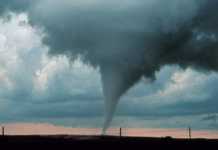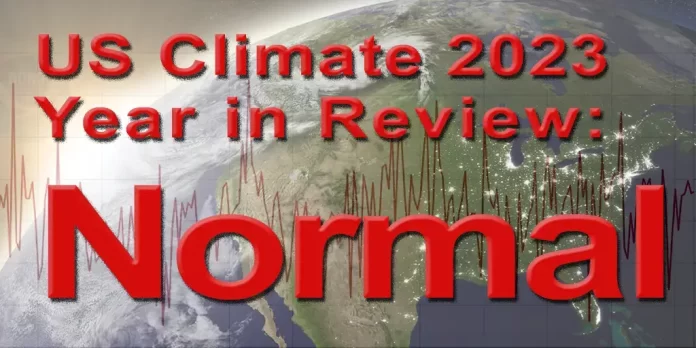From Dr. Roger Pielke Jr via WattsUpWithThat
The year is not quite in the books, but it is late enough that we can have a look-back at this year’s weather and climate extremes.
We are all well aware of the narrative that the weather is quickly getting worse. Unfortunately, data does not agree.1
The weather — and certainly the impacts — of the past 12 months in the United States was actually pretty typical, even benign, in historical context.2
The one variable that stands out among extreme weather is temperature — extreme high temperatures in summer and (in particular) winter were very high in 2023, both of which contribute to a long-term trend that the IPCC has attributed primarily to the emissions of carbon dioxide from the burning of fossil fuels.
The table below provides the top-line summary.

This year will come in well below average for the total and insured economic costs of disasters in the United States, mainly because the only landfalling hurricane (Idalia) resulted in less than $1 billion in total damages, far less than the $22+ billion of an average hurricane season.
Let’s take a quick, but detailed, look at 2023.
Average Temperature Anomaly

Month-by-month, 2023 ventured above and below the zero-line of the NOAA temperature anomaly time series (the USCRN). You can see from the figure above that there is no trend in this time series since December 2000, which is counter to what has occurred globally.
Extreme Heat and Cold

The figures above for January (top) and July (bottom) show clearly that maximum temperatures have increased since 1895 for both winter and summer, as is expected. July, 2023 was the 13th warmest July since 1895.
Also, take a look at the 1930s for July, the 3 big dips in 1915, 1950 and 1992, and 1976-1977-1978 for January — Brrrr!3
Hurricanes

You can see a full post on the US 2023 hurricane season here. Lots of interesting details, but as far as landfalls and damage, just Hurricane Idalia which was preliminarily classified as a Category 3 storm, but to date just over $300 million in insured damage … Zzzzzz.
Flooding
The US sees a lot of flooding every year. It is normal. This year saw its fair share but nothing unusual or particularly damaging. Disaster declarations don’t tell us anything about climate, but they do tell us something about disaster declarations — 2023 saw (to date) 19 flood-related FEMA disaster declarations, which is just about exactly the average from 2000-2022.4 You can dive much deeper into trends in US flood at this recent post. 2023 will no doubt be consistent with the trends documented there.
Drought

2023 was not particularly exceptional for drought in long-term context. In fact, compared to one year ago, 2023 has seen a markedly improvement in US drought conditions, as you can see below — with December 2022 on the left and December 2023 on the right. 2023 ends the year just about in the 50th percentile of months since 2000 for area under exceptional and extreme drought.

The figure below shows the proportion of US land area characterized as “very wet” and “very dry” from 1895 to 2023. If you squint, you can see that “very dry” has declined a bit, with extremes reduced dramatically since the 1950s, while “very wet” has increased, with more extremes since the 1980s. Fascinating, as Spock would say.

The “very wet” and “very dry” time series has a lot of month-to-month variability — in 2023 the “very wet” area ranged from 0.81% of the country (Nov) to 23.56% (Jan), and “very dry” from 3.36% (Jan) to 23.07% (Jul).
Tornados, Hail, Wind

The figures above show from left to right, tornadoes, hail and wind local storm report counts, based on preliminary data for 2023. The data shows that tornadoes are a bit above the recent average and hail is a bit below. Winds, in contrast, were exceptionally high in 2023. Given that convective storms produce tornadoes, hail and winds, I am looking forward to how meteorologists explain these contrasting trends of 2023. Economic losses from hail and wind were quite large in 2023.
Wildfire

Remarkably, 2023 has seen the fewest acres burned in the US since 1998. Everyone has heard about the record wildfires in Canada, but the quiet US season has been largely ignored.
Thanks for reading! THB is reader supported and reader appreciated. If you value what you read here, please consider supporting the work that goes into it. THB is an experiment in how to do independent research and writing, and the success of that experiment depends upon you — News to come soon on that, thanks to the THB community. Comments, questions, critique are all welcomed. Happy holidays!
Notes:
1 The media’s reluctance to accurately report actual data remains amazing to me.
2 Climate science suffers from the generational loss of empirical climatologists such as Will Kellogg, Stan Changnon, Bill Gray, H.H. Lamb and many others. I am really fortunate to have known and learned from many of them.
3 There is so much interesting research on observed climate variability goes undiscussed due to a monomaniacal focus on projected climate change.
4 Fortune, fame and a nice H-Index await the researchers who can develop a meaningful index of flooding for various spatial scales — including nations and the world — that allows for an intuitive understanding of trends.




















Total dunderheads who never can stand the fact that things are normal! They don’t like data, facts, truth, analysis because it doesn’t fit their ideology and narrative! These are earth firsters and don’t want anything spoiling their nirvana of climate cookness! We need more folks speaking up about these phonies and their lack of knowledge and expertise on a topic they seem to want attention but don’t have any control over!
Climate is global. 2023 has been the hottest year for planet earth on record.
Climate update for 2024. The year 2024 has been the hottest year on record globally. The 10 hottest years on record have been the last 10 years. Anthony Watts is a weather man that is refuting an entire world of weather Scientists. He is out of his depth and grasping at any data he can twist that supports the Heartland Institutes objectives of misinformation about climate change.